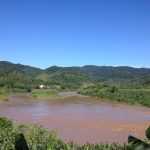By Edward Shore
Quilombola Seeds is the second in a three-part series produced by the Instituto Socioambiental (ISA). It explores quilombola agricultural systems in São Paulo’s Ribeira Valley, the last reserve of endangered species and wildlife in Brazil’s most heavily industrialized state. Quilombos are rural black communities descended from fugitive slaves in Brazil. Onerous environmental restrictions have prevented quilombos in the Atlantic Rainforest region of São Paulo from planting subsistence garden plots that their ancestors maintained for centuries. As a result, quilombos have last many rare varieties of beans, rice, and corn. Malnutrition has skyrocketed. Communities faced food shortages. Now, with the assistance of researchers and the Instituto Socioambiental, the region’s quilombos are fighting back! This video includes English subtitles produced by our public historian, Edward Shore, and ISA anthropologist and videographer Alexandre Kishimoto.
[jwplayer player=”2″ mediaid=”15206″]
The views and opinions expressed in this article or video are those of the individual author(s) or presenter(s) and do not necessarily reflect the policy or views of the editors at Not Even Past, the UT Department of History, the University of Texas at Austin, or the UT System Board of Regents. Not Even Past is an online public history magazine rather than a peer-reviewed academic journal. While we make efforts to ensure that factual information in articles was obtained from reliable sources, Not Even Past is not responsible for any errors or omissions.



